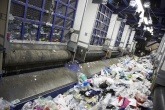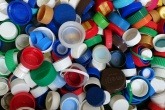UK adults over-estimate plastic recycling efforts, poll suggests
A study by the Environmental Services Association (ESA) and the British Plastics Federation (BPF) finds self-reported plastic recycling rates do not align with national figures. Time constraints and confusion are identified as possible barriers to plastics recycling.
 The study comprised national polling with 2000 UK adults, followed by focus group discussions with 10 respondents. It found that 60 per cent of adults claim to ‘always’ recycle plastic, with another 34 per cent stating they ‘usually’ do. Only one per cent say they ‘never’ recycle.
The study comprised national polling with 2000 UK adults, followed by focus group discussions with 10 respondents. It found that 60 per cent of adults claim to ‘always’ recycle plastic, with another 34 per cent stating they ‘usually’ do. Only one per cent say they ‘never’ recycle.
However, according to the ESA and BPF, trade groups which represent private sector waste management operators and the UK plastics industry, respectively, national recycling figures don’t match up.
“The claimed high level of plastics recycling may be more indicative of the perception that this is what is expected within UK society, than of actual behaviour”, the ESA and BPF said.
Despite high self-reported recycling rates, focus groups revealed several barriers to plastics recycling. Confusion was a key hurdle, with 70 per cent of respondents saying they would recycle more plastics if they were better informed on which plastics can be recycled at home. Inconsistent recycling regulations across local authorities, as well as varying recyclability of different parts of certain products, may contribute to this confusion.
One respondent commented in a focus group interview: “I didn’t realise until recently that not all plastic is recyclable; certain types of plastic aren’t. To be honest, it’s a bit of a minefield.”
Time pressure was also highlighted as a barrier to plastics recycling, with households with young children being less likely to ‘always’ recycle. One respondent explained: “I do feel strongly about recycling but I do know I definitely could do better. I’ve got such a busy lifestyle and a 10 year old daughter who does such a lot of activities.”
As well as exploring attitudes towards recycling, the study helped to identify characteristics of different audience segments within the UK adult population. The ‘always recycle’ group tended to be older (with no children at home), were more likely to be female and were typically based in Wales and the South-West.
The ‘usually recycle’ group comprised younger adults and parents with children aged zero to ten. These individuals displayed lower confidence in the fact that the materials they put in their recycling bin actually get recycled, suggesting that trust in plastics recycling systems impacts recycling behaviours.
Only 61 per cent of respondents expressed confidence that their recycled plastic gets processed correctly.
Both groups sought clarification around plastics recycling and were actively engaged on social media, offering a potential point of intervention for information about recycling.
Plastic Recycling Facts Campaign
To raise consumer awareness of and confidence in plastics recycling, the ESA and BPF launched a ‘Plastic Recycling Facts’ campaign. The initiative comprises a digital information hub and social media content, including collaboration with six micro-influencers.
Influencers, all busy mothers who would resonate with the ‘usually recycle’ target audience, were taken to a Materials Recycling Facility where they were able to see first-hand how much plastic waste is collected and how it is processed after it’s taken away from our houses.
The ESA and BPF report that influencer content gained a positive response and sparked pockets of conversation on Instagram around plastics recycling.
Jacob Hayler, Executive Director of the ESA commented that the campaign “reinforces the importance of recycling plastic properly to conserve resources, reduce pollution, and support a more circular economy.”
“We want to explain which plastics can be easily recycled at home and which may need to be taken to other facilities, but also take consumers on a journey to see what happens to plastic once it's collected. By demystifying the process, we hope to show that recycling isn't just a black hole or wishful thinking - it's a thriving industry and a vital part of solving the world’s environmental challenges.”








